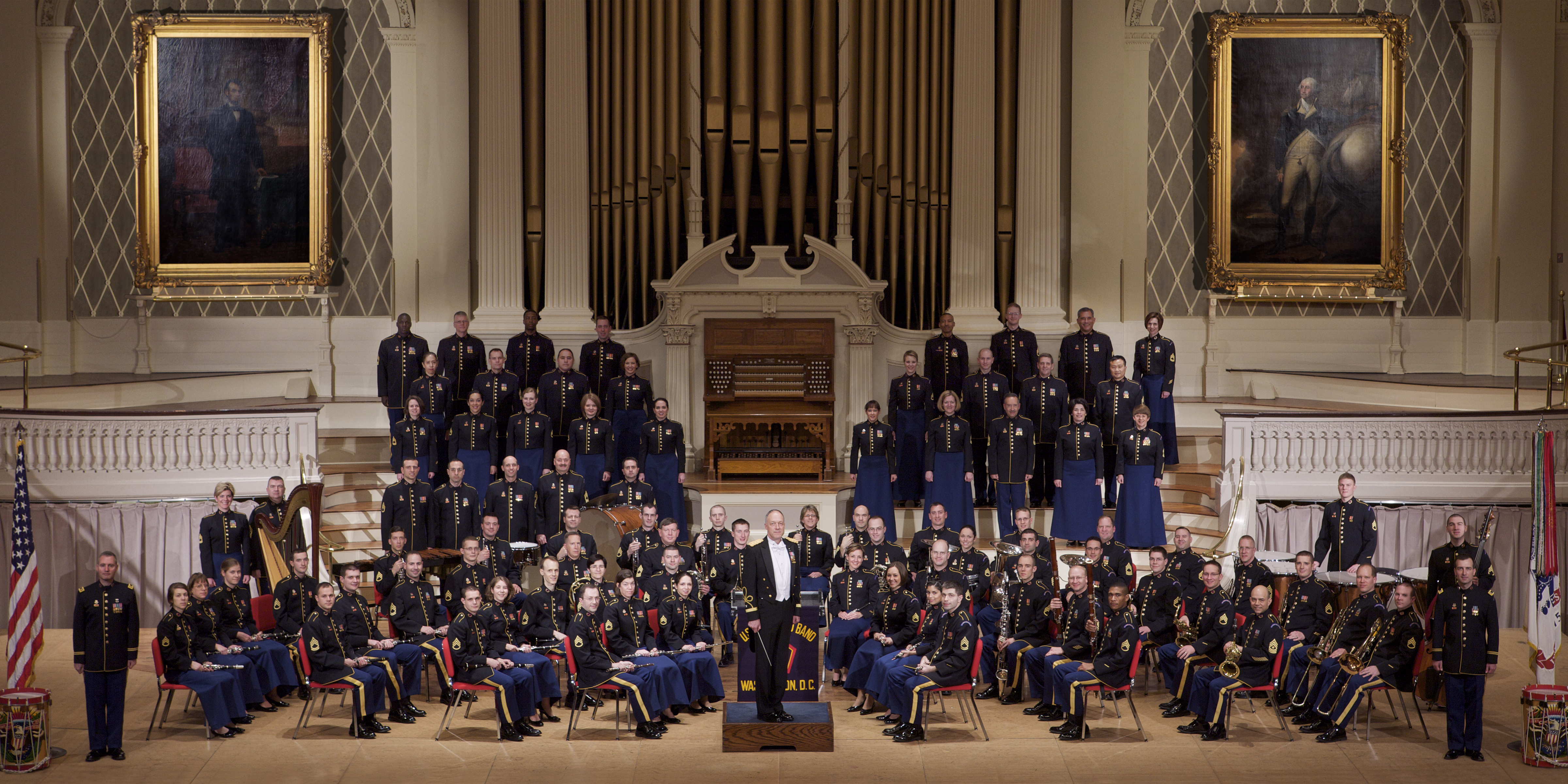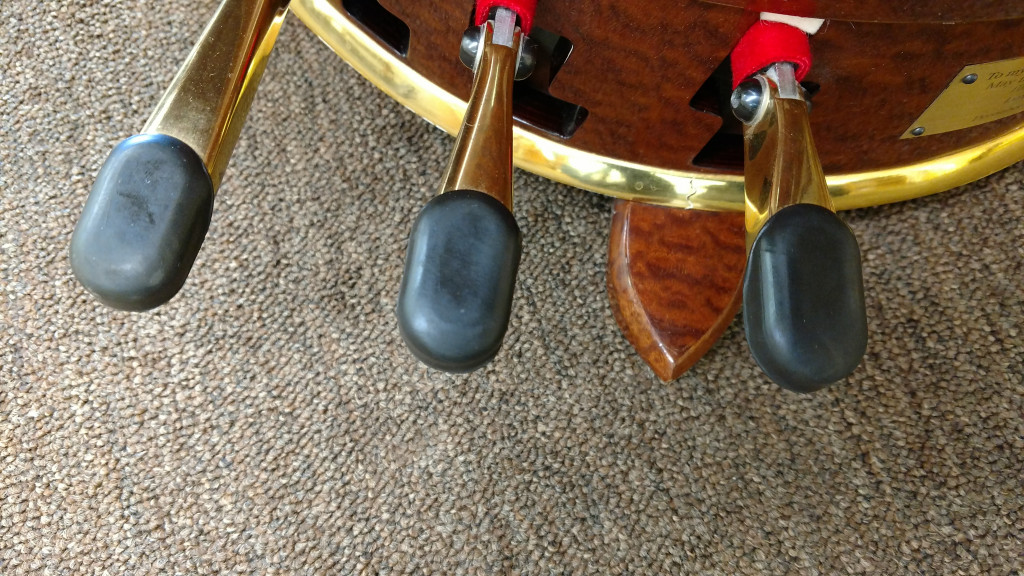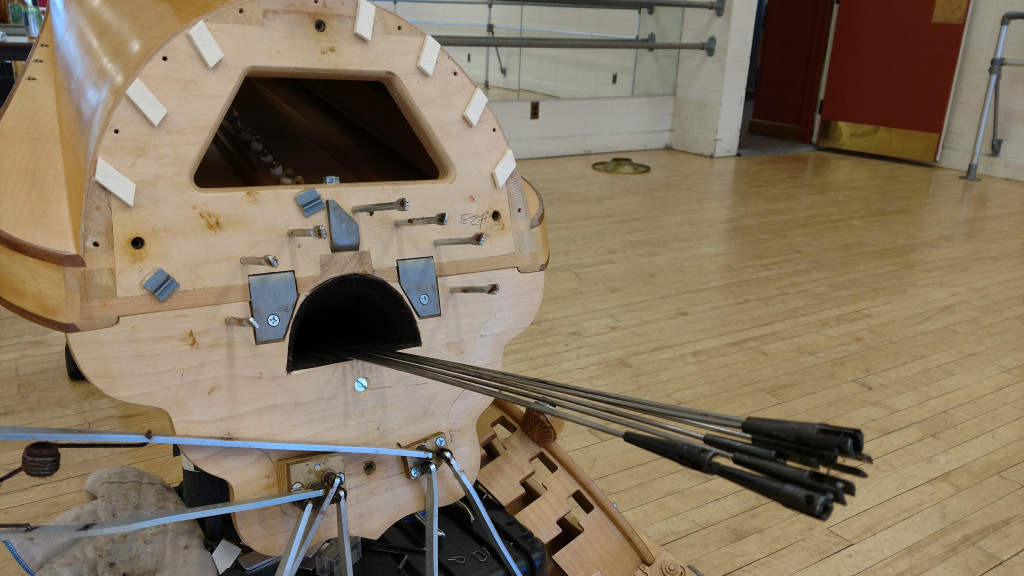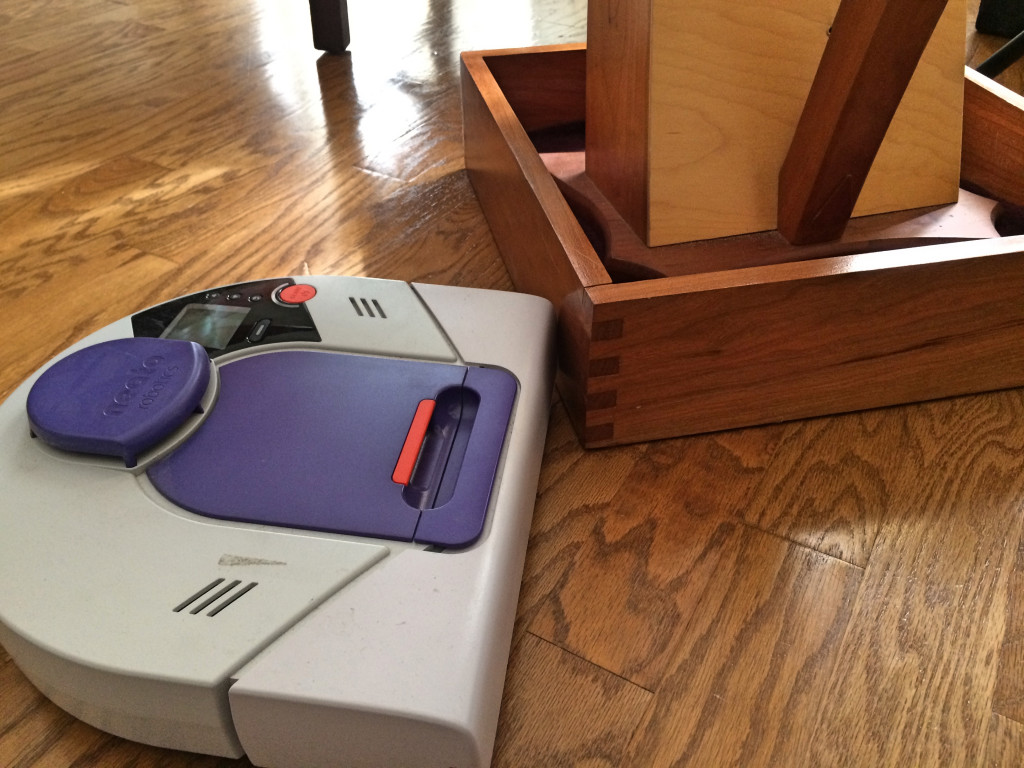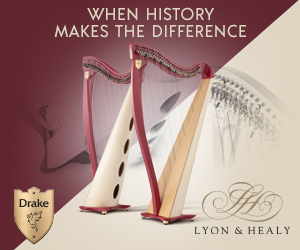I have experienced the full gamut of the grief experience as this blog post has been brewing inside of me for the past month. I can remember the first time I saw the posting:
U.S. Army Field Band – Harp/Piano
My heart sank. Not because I dream of being a military harpist, but from seeing yet another full-time harp position go the way of the dodo bird. I know that I am not the only harpist out there who has seen this posting and felt this way… I have heard from many of you as I reached out to get opinions, ideas, and suggestions for this blog. I have my own opinions about this, which have morphed over time and through getting to speak with some of the people directly and adjacently involved with this decision, and we will get to that. But first I ask you try to see the bigger picture here. It is easy to be mad at the people who made this decision, to curse the ensemble that would dare do away with the harpist, but I think that there is something bigger at play here in our field: relevance.
How many of you that teach harp at universities have tenure-track jobs? Do you remember when a full-time second harpist in an orchestra was a thing? Heading out for tea? Don’t expect to see a harpist in most cities… those jobs are disappearing left and right. I don’t say all of this to be a negative… but rather I hope to bring recognition to the fact that we must fight to remain relevant in a world that is changing all around us!! This goes hand in hand with my last post and is something that has been plaguing my mind recently. How do we find a way to ensure that we don’t become old-fashioned; that in 50 years kids will still want to start playing the harp? I don’t have any answers… yet… but I am hopeful. I see the good work of harpists around me and I thank my lucky stars to be a part of such a vibrant community, but there is always more to be done.
“Be All That You Can Be”
When I say that I went through the 7 stages of grief after learning about the U.S. Army Field Band position I am serious. My arrival at ACCEPTANCE & HOPE was aided greatly by the many people who were willing to speak with me throughout this process. This topic is a complicated one… and I aim in this blog to represent the issue in as clear and un-bias a way as possible. I welcome any thoughts, feedback, or questions in the comments below or through email at: kfinchharpist@gmail.com.
Stage 1: SHOCK & DENIAL
I was on my way to see a movie when I first came across the U.S. Army Field Band job listing. My initial thought was: how could this be? How could they get rid of their full-time harp spot, and where do they think they are going to find this person who will be able to fill the role of concert pianist AND harpist? I was pretty shocked. A good friend said to me “The next U.S. Army Field Band job listing will be for French Horn Player/Tornado Chaser?” Funny, I thought… but this must be a joke.
Stage 2: PAIN & GUILT
This, it turns out, was not a joke. Stage 2 is probably the stage I relate the most closely to… but perhaps for not the typical reasons. I have no pain or guilt over the fact that I never auditioned for the job when it was available, or will never have the opportunity now… rather it is for all of the harpists coming out of Bachelor, Master, and Doctoral programs, eyes to the sky and looking to make their print on the world. I have only been out of school for two years… but that time has taught me more than a few harsh lessons about the reality of being an adult, and the loss of this job a loss for all of us.
The U.S. military is one of the few institutions that provides steady, reliable work for musicians throughout the world. I have more than a handful of friends who have accepted these positions and continue to thrive through this work opportunity for years, or have chosen to take the 4-year required enlistment time to save money, grow a family, and then go out into the world to shape the minds of young musicians, have outstanding performance careers, and teach at some of the best institutions of higher learning that this country has to offer. I felt, and feel, a visceral pain at the thought of the harp performance major just coming out of school in the search of steady work only to find what little there once was is quickly disappearing.
Stage 3: ANGER & BARGAINING
I spent a long time in this stage. This was around the time that I started asking others for opinions regarding this matter, primarily on Facebook and through personal emails. So many people expressed the same shock and anger that I had felt. “How could they do this to us?” I asked myself, “Don’t they know how important this job is?!” Thank you to everyone who fanned the fire in this stage, because without the anger and passion you stirred inside of me I never would have made it to acceptance. Through this anger I made the decision to attempt contact with the auditions coordinator of the U.S. Army Field Band: MSG James Woods.
I went into our phone meeting ready to give this man a piece of my mind. I was ready to tell him what a mistake they were making, and how he, personally, was disrespecting the art of playing harp by suggesting that it wasn’t worthy of a full-time position. Our conversation lead me straight into the next and worst stage…
Stage 4: DEPRESSION, REFLECTION, & LONELINESS
MSG James Woods surprised me from the start. Throughout our conversation he expressed genuine sadness at the situation in which the U.S. Army Field Band finds itself in making this decision and at the stir it has caused in our community. He told me that he himself is a trumpet player and that he understands the importance of a job like this to our field.
When I asked him about the 2014 posted audition for full-time Harp that was canceled he explained that the decision coincided with the instatement of the new Commander for the U.S. Army Field Band, Colonel Jim R. Keene. Previously in command at the West Point Academy, Colonel Keene is known for shaking things up, and making changes that often favor audience engagement rather than tradition, as I was told by more than one friend who is in a military band.
Of course, everything is tight right now. Just like every person, institution, and business in the world the U.S. Army Field Band is expected to tighten their belt in lean times. MSG Woods explained that they were given a reduced number of billets (or positions that can be filled in the band, regardless of instrument) and the decision to hold an audition for Harp/Piano had come out of a great need for another pianist on staff. That their current pianist is far over-stretched, having to perform not only with the concert band, but also with the Soldier’s Chorus, as well as fulfilling their extra duties. Not only that, but the harp is historically under-utilized in this ensemble, often only performing on the opening number on a concert. Also… did I mention that the ensemble tours at least 100 days out of the year, in this country and abroad? MSG Woods was also sure to mention that during the summer all concerts are outdoors (a harpists dream).
Our conversation ended with MSG Woods, sadness in his voice, expressing the concern that if they weren’t able to find the right person it was likely that the harp position would be done away with completely. The darkness descends.
Stage 5: THE UPWARD TURN
 After speaking with MSG Woods I was pretty depressed about all of this. I was at a point where I no longer thought I would even be able to write this blog, and that all of the time I had invested into research, interviews, and thought had been wasted. Then along came Missy Dunne. Missy served as full-time harpist for the U.S. Army Field Band for 14 years, and for that reason has A LOT to say about the job. When I asked her if she felt the band warranted a full-time harpist she said:
After speaking with MSG Woods I was pretty depressed about all of this. I was at a point where I no longer thought I would even be able to write this blog, and that all of the time I had invested into research, interviews, and thought had been wasted. Then along came Missy Dunne. Missy served as full-time harpist for the U.S. Army Field Band for 14 years, and for that reason has A LOT to say about the job. When I asked her if she felt the band warranted a full-time harpist she said:
“NO… When we go on tour we play 4 concerts and switch them out every night, there were many concerts where I would only play 1 tune the whole gig!!!! The band has its own arrangers, but they do not put out good harp parts. I gave them a harp scoring book and tried to help, but I constantly got bad harp parts. I was given everything from celeste to banjo parts and it was assumed because I play a string instrument I could play guitar parts or what have you. One day I had BOTH parts for Daphnis and Chloe on my stand… so I was supposed to play harp 1 and 2 (in the band key and sight reading) for a rehearsal.”
In regards to the outdoor concerts while the band is on tour, Missy said:
Oh Kristina.. the harp and the outdoor concerts. That’s probably my biggest complaint that I had with the Band. The harp sits on a NON climate controlled truck for the entire tour…. so it bakes in the heat all day long everyday and then continues to bake in the sun when it’s set out at the concert venue. It was always a fight (14 years of the same complaints from me) that the harp shouldn’t and CAN’T be used for the outdoor concerts. The band naturally goes sharp in the heat, and as you know, the harp goes flat. During some outdoor concerts it honestly sounded like I was playing in a different key, the harp was that flat. If I had stayed in the band, I would have come to some kind of agreement with the Command that the harp shouldn’t go on summer tour. It’s not like the National Symphony who keeps the harp in a climate controlled environment and then moves it to a location (under cover) for the evening. The band usually performs in direct sunlight. I think as the only fixed pitch instrument that has to be tuned, versus percussion instruments, no one really understands other than a harpist. Many times I was asked to take the harp off the truck, put it in the shade and then quickly tune it and move it to the “stage” right before the concert. The section leaders and command staff do NOT have any idea how the harp works and assumes it can just be tuned “really quickly” then moved into the sun and sit for 30-40 minutes before you play and it will magically still be in tune. Tuning with the band was a GIANT issue. The harp always sounded flat and I was looked at like “can’t you just tune it real quick?”, mind you, you are trying to tune while sitting next to 14 clarinets and 7 trumpets blasting away right next to you and you can’t hear the harp AT ALL.”
To end out conversation, Missy had to say:
The job in the Army Field Band could be the BEST job in the world, as a musician and performer…. yet with the circumstances and complete mis-understanding of the instrument…. it’s not yellow brick road to happiness in employment. There are many challenges and many expectations of the harpist that are just completely un-realistic for even the worlds greatest harpist/pianist… but I doubt there is even such a player.”
It might surprise you that this conversation was what brought me to my upward turn. Missy didn’t have anything good to say about this job, and perhaps it was for this reason that I started to feel a little better about this job posting. I wouldn’t touch this job with a 20 foot pole before, and even more so now that I had this information about the requirements and hardships put on the harpist. Maybe we are losing a job… but who would want to do this anyway??
Step 6: RECONSTRUCTION & WORKING THROUGH
Armed with this new information I felt I might finally be ready to put something down about this job posting. I was feeling like the U.S. Army Field Band was maybe doing us all a favor. I made the decision at this point to reach out to as many harpist/pianists as I could find willing to speak with me in order to put this job into a little more perspective for myself. Was this job even appealing to harpists who are also pianists? Missy had revealed the true nature of the job to me, but it was at this time that I became aware of the fact that there might still be that person out there for whom this would be the perfect job.
I heard back from three harpist/pianists who were willing to speak with me about this job opening:
Given the job description and pay is this a job you would have ever considered taking at any point in your career? (Pay is apx. $60k/yearly)
 Betsy Fitzgerald:
Betsy Fitzgerald:
“Just out of college, I would probably consider this position because it appears to be a very solid, permanent position that has a great salary compared to my other options. Those options would include gigging (i.e. weddings, etc.), per service orchestra and church work, teaching, etc., income that isn’t completely reliable and consistent. The benefits also seem great, especially the opportunity to fully retire in 20 years with full pension, which would have been around 42 for me.
Now that I’m older and also have considerable knowledge of how the military music organizations work, I would definitely pause before applying. First, it is very apparent that these are two full time positions merged into one, and that it would be a physically demanding job to be switching back and forth from piano to harp. Even with the steady income and benefits, it would be a hardship to be gone on tour so much particularly if I had a family and any outside performance work or teaching I may consider would not be feasible due to the very fluid schedule. I also would worry about the “other duties” assigned, which often turns into a desk job of some sort that takes up valuable practice time.”
![]() Kristen Agresta Copely:
Kristen Agresta Copely:
“Yes, I would have considered this position earlier in my career, perhaps just out of grad school or in my 20’s. It’s not a job I would relocate for at my current age or stage.”
 Jessica Frost-Ballas:
Jessica Frost-Ballas:
“…In the more rural area where I’m currently living that is a very reasonable salary especially considering the benefits that come with the job. It is possible to make an equivalent salary teaching privately; however, it is not easy. I am very thankful to have large private studio (and great benefits via my husband’s employer) but I know other teachers in the area have struggled to make a living and support a family.”
If the audition tape is due on March 4, is there a reasonable amount of time to prepare the required tape materials on both instruments?
Kristen Agresta Copely:
“I believe there’s reasonable time to prepare an audition tape on both instruments, particularly if the musician is actively working/performing with both harp & piano.”
Jessica Frost-Ballas:
“I think it’s a doable audition list for someone who keeps their performance levels at both instruments very high (and also has a background in jazz piano). I do play both the harp and piano but they’re not at equal performance levels as I chose to focus mainly on harp in college and I did not study jazz piano at all. Again there is probably a musician out there who is capable of doing all of those things but certainly not as many as those who focus on one or the other.”
Betsy Fitzgerald:
“The time line for the audition tape is not ideal, particularly because of the need to include accompaniments with a soloist. I think it is safe to safe the ideal candidate for this position would be a very strong harpist who happens to also have strong piano skills and I think it would be safe to bet that that person uses those piano skills teaching and maybe playing solo gigs. I doubt they may be actively accompanying and if so, it may not be repertoire that would be right for this audition tape. If it was only a harp audition, I think it would be enough time as those are common things that should be in the fingers of harpists looking for work. For a pianist, I would say that the solos would be easily doable but again, the works with another musician would complicate matters.”
Any other thoughts in general about this audition/job opening?
Jessica Frost-Ballas:
“I feel like there are plenty of very talented pianists who will be unable to audition as they don’t play the harp and plenty of talented harpists who will be unable to audition as they don’t play piano. I’m sure there are musicians who could do both but they’ve definitely narrowed the applicant field.”
Betsy Fitzgerald:
“I think it is very rare to find someone that excels at the same high level on both harp and piano. Many years ago, I would say I kept my skills at the same level but as you age and prioritize your life, you must find a life/work balance and you will be required to choose where you spend your time. I do know that in the working world, it not uncommon for a job description to be altered when a specific candidate is in mind. I am not sure if that is the case here but it certainly makes me wonder due to the tight time line and the specific requirements for both classical and popular/jazz experience on the piano.”
Kristen Agresta Copely:
“In general, I have always been excited about opportunities to play both harp and piano! I would definitely audition for this if it were at a different point in my life/career.”
Step 7: ACCEPTANCE & HOPE
This brings us to the final stage in the grief process. If you’ve made it this far in the blog (I know this is a lengthy one…) I hope that you have come to the same conclusions that I have:
- It’s truly a shame that this position be combined with piano, and they will likely have a great deal of trouble trying to find the perfect person for the job.
- The vast majority of people in and around the U.S. Army Field Band are just as bummed as we are about this turn of events.
- This is a crazy job that would require the most flexible, patient, willing human on the face of the planet…
- Although it is likely that this whole debacle will blow up in their faces, I honestly and genuinely hope that it doesn’t. I hope that there is a person out there who reads this blog and thinks: “I could do that!”
I have hope. MSG James Woods was sure to mention that it would only be a few more years before the Command was rotated again, and that perhaps the next person might re-instate the harp as a full-time position. Whether that happens or not it is our job now to ask ourselves: where are the jobs going? What can we do to make ourselves valued more? What can we do on a day to day basis to insure that we remain relevant in this ever-changing world?
Harpists are some of the most creative people that I have ever come in contact with (we have to be!)… and it to us all that I issue the challenge of finding a way to engage more with our communities, and fight to keep our craft as alive and vibrant as it is today for future musicians and audiences. Like I said at the start of this blog, I don’t have any answers… I am seeking to start a discussion, and spark the flame of creativity, entrepreneurship and hope in our beautiful, diverse, and vibrant community.
Do you have thoughts on this U.S. Army Field Band posting? Comment below and keep the conversation going.






